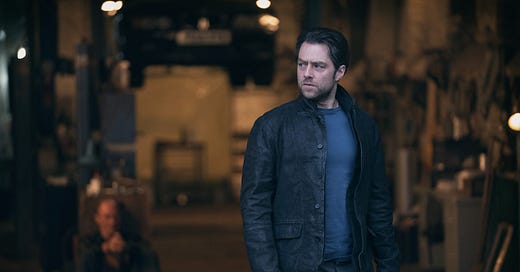Rebus, redux, as philosopher
In our household, we’ve read quite a few of Ian Rankin’s Rebus books, watched a lot of the television versions, four seasons of them.
Like many people I know, we saw Ken Stott as the embodiment of the character we knew from the novels, the grotty John Rebus, an Edinburgh detective who drinks too much, has a fine taste in jazz, and a back story of a shattered love life. He’s doesn’t fit in, like a lot of the classic detectives in fiction. Nor does his sidekick, Siobhan Clarke, who is none of the above, but she’s English, and so she doesn’t fit in either.
Unlike most people I know, I rather liked John Hannah’s portrayal in the first series, which aired in 2000, even though I saw it only as a rerun, years later, after I had grown used to Stott’s characterization. Both actors, I felt, did a good job of projecting facets of the character’s personality amid the towering, dark granite caverns and narrow, steeply sloping streets that make the Edinburgh old town itself a character in the drama.
The Rebus books are better written than a lot of crime fiction – crisp sentences cut into expansive mediations and combine to say there’s something larger at work, more than finding the bad guys. Rebus never succeeds in righting all the manifold wrongs. The television versions are compelling enough to watch again and again. And we did, on and off.
Rebus retired in 2007, aged 60, when compulsory retirement ages were still legal in Britain. But his novelist reinstated him when the law changed four years later, retired him again, and kept him going for a few more novels. The adaptions by the British television network ITV stopped in 2007, though, when Stott grew tired of the role. Ian Rankin didn’t like the short format of the last season, so he bought back the TV rights in 2012. Nothing much happened. Until now.
In May 2024, a rebooted Rebus appeared on the screens, this time on BBC and without commercial breaks, and as one story told over the six 45-minute episodes. Rebus, played by Richard Rankin (no relation) is younger than the character we knew and loved, younger even that the one John Hannah portrayed. It’s the 2020s, too. Ian Rankin has reincarnated our hero, years later and decades younger and now a mere detective sergeant, as he was back in 1987 in the novels. The supporting cast are all much more youthful, too. Ah, the elixir of imagination works its magic, again!
And it’s a different John Rebus, foul-mouthed given over to beating up suspects, with a brother, Michael, who’s a shady character and jealous of John’s not-very-glamorous life, for reasons that defy explanation beyond that John is a bit less messed up than Michael.
Most of the people I know didn’t like the new series. The language, the violence, the drugs felt excessive, out of place. Maybe because the people I know are a decade and a half older. I didn’t like them much either, but I had a hunch something else lurked beneath the surface. Let’s see …
It isn’t that the language, violence and drugs are out of place; they are out of time. It jars with our tastes now. It jars too that our hero is one of the bad guys and still demands us see him as a hero. The only redeeming feature of the new John Rebus, is his love for and loyalty to Michael. Family rips against justice. We watch to find out which one ends in shreds.
A surprise emerges, however, half-way through the final episode, and it’s not one of plot, so no direct spoilers. Ian Rankin, as scriptwriter, lets the Rebus we knew have more than a mere reincarnation. The brut we’ve watched for almost five hours opens out into different, subtler and more intriguing form, an accidental philosopher. He tells another character, he tells us, the audience – and himself – things none of us knew about ourselves. Rebus says:
I think I may have done something daft. I saved someone’s life.
The themes of the story involve conflicting loyalties; betrayals; dilemmas that cannot be solved, just managed, coped with. It shows the messiness of existence and irresolution, not clever conceits. They run through the plot – and the subplots. Is this existentialism enacted? No, there’s something else, something larger and more visceral than self-against-world.
This introspection – by Rebus, and us – comes very late in the storytelling. Might it have been more evident earlier? We know that Rankin is a gifted storyteller, however. Maybe we should trust him even when the story seems wrong. Maybe we have misjudged the first four and a half hours.
If you watch it – and you may not like it, not at first – persevere. As Rebus, redux, does. As Rankin does.




